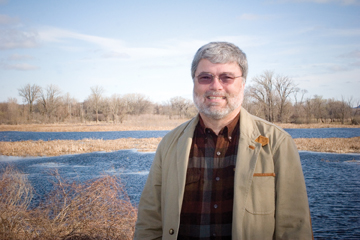[caption id="attachment_432" align="alignleft" width="360" caption="James Wiener, Wisconsin Distinguished Professor at UW-L, was a co-author of the report, “Great Lakes Mercury Connections: The Extent and Effects of Mercury Pollution in the Great Lakes Region.” "]

[/caption]
UW-La Crosse faculty contribute to Great Lakes mercury report
An extensive scientific research report on mercury in the Great Lakes region being released in Detroit this week has La Crosse ties. Four University of Wisconsin-La Crosse faculty researchers played key roles in the extensive regional assessment.
James Wiener, Wisconsin Distinguished Professor at UW-L, was a co-author of the report, “Great Lakes Mercury Connections: The Extent and Effects of Mercury Pollution in the Great Lakes Region.” The summary of scientific research found that the impacts of mercury pollution in the Great Lakes region are much greater than previously reported. The report reveals that general mercury levels in Great Lakes environment, fish and wildlife over the past four decades have declined because of pollution controls. Yet, studies show mercury concentrations still exceed human and ecological risk thresholds in many areas and may be on the rise in some species and locations.
“The research reveals that most mercury is coming from the atmosphere,” notes Wiener. “Coal-fired power plants are the dominant source of human mercury emissions, accounting for more than half of the regional emissions.”
The reports draws on 35 peer-reviewed papers published in special issues of two scientific journals, “Ecotoxicology” and “Environmental Pollution.” It represents the work of more than 170 scientists and researchers who analyzed data from more than 300,000 mercury measurements to better understand its impact. The project is a collaboration of
UW-L’s River Studies Center, along with the Biodiversity Research Institute in Gorham, Maine, and Great Lakes Commission, based in Ann Arbor, Mich.
Since coming to campus in 2001, Wiener has helped to put UW-L on the map with mercury research.
“The UW-La Crosse River Studies Center has achieved world-class standing in mercury contamination research,” explains Wiener. “Much of that credit goes to our outstanding undergraduate and graduate students who do a lot of the extensive field and laboratory work needed for this complex area of study.”
Other leading researchers from UW-L with findings in the report are Chemistry Professor Kristofer Rolfhus, who studies mercury in the lower food web, Biology Professor Mark Sandheinrich, an authority on the effects of mercury contamination on fish, and Biology Professor Roger Haro, who is examining the utility of larval dragonflies as widespread indicators of mercury pollution.
Wiener says while mercury contamination doesn’t typically cause fish or wildlife kills, it is responsible for diminished reproduction of some species. More importantly, pregnant women who eat large quantities of mercury-contaminated fish risk impacting the development of their fetuses through mercury’s effects on fetal brain tissue and intelligence.
Wiener says steps taken in past decades to reduce mercury contamination in the region’s rivers and lakes have produced encouraging results. “But we still have a substantial problem,” he notes. “Conditions in the Great Lakes themselves look good, but we still have a serious problems with many inland lakes and rivers. Observations of recent increases in mercury concentrations in some fish and wildlife populations in the region are a cause for concern, particularly because we do not understand why these increases are occurring.”
Wiener says the extensive report will spark more conversation among scientists, policy makers and citizens. He hopes discussion will influence management decisions to further reduce the risks of mercury in the Great Lakes region and beyond.
UW-L faculty — and their students — continue to investigate environmental pollution in the upper Midwest’s rivers and lakes. Wiener is pleased that UW-L’s expertise and advanced capabilities have contributed greatly to scientific understanding of the environmental mercury problem.
The UW-La Crosse River Studies Center, created in 1972, focuses on research and informational programs with an emphasis on resources of the Upper Mississippi River basin and the Great Lakes region. The center has extensive interdisciplinary partnerships with several state and federal agencies and other universities. Among them: the U.S. Geological Survey, Wisconsin Department of Natural Resources, Minnesota Pollution Control Agency, National Park Service, UW-Madison, the Biodiversity Research Institute, and the U.S. Environmental Protection Agency. Center investigations have provided research opportunities to nearly 100 graduate students and more than 250 undergraduates. See more at: www.uwlax.edu/biology/rivercntr/.
View the official news release from the Biodiversity Research Institute.
View the on-line, special issue of Ecotoxicology.

 [/caption]
[/caption]
 [/caption]
[/caption]